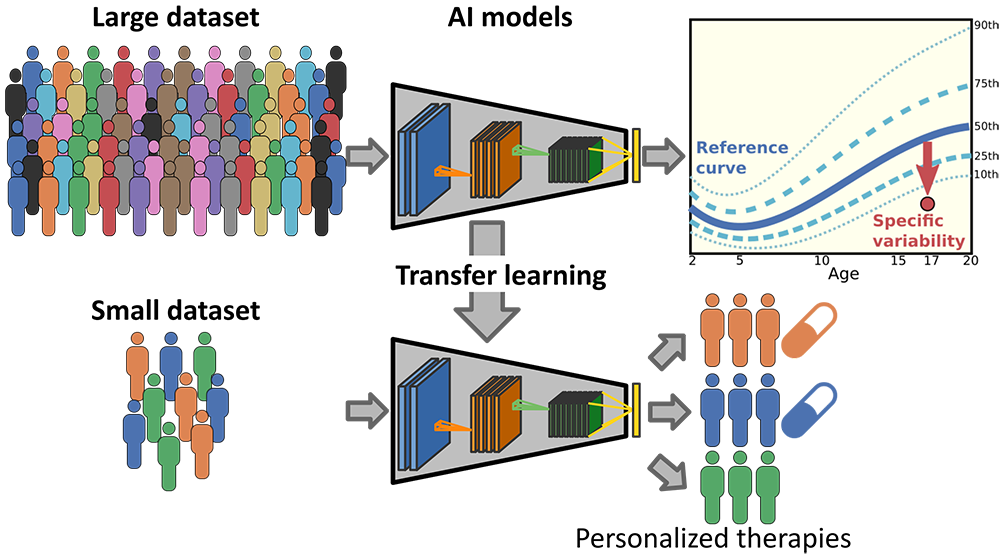
Transfer learning strategy to bridge the gap between big and small data
Exploring the potential of representation and transfer learning for anatomical neuroimaging - application to psychiatry.
Artificial Intelligence (AI) combined with neuroimaging opens up possibilities for personalized medicine. With this long-term objective, we developed four lines of research:
MODELS TO PRODUCE INTERPRETABLE BRAIN SIGNATURES OF DISORDERS
We investigated new predictive linear models that integrate prior biological knowledge to force the solution to adhere to biological priors, producing more plausible interpretable signatures. These models have been used to uncover an anatomical pattern of schizophrenia and a functional pattern for hallucinations. We embraced the applied mathematic challenge of creating scalable optimization solvers [for high-dimensional neuroimaging data while being flexible enough to integrate various priors.
MODELS TO BRIDGE THE GAP BETWEEN BIG AND SMALL DATA
Thanks to the award of a Chair in AI (2020-2025), we proposed new weakly-supervised deep neural networks that are pre-trained on large datasets of controls, using auxiliary information such as “age” to improve the embedded representation of the general variability. Models are then transferred to smaller samples of patients to reveal the specific signal associated with psychiatric disorders.
MODELS FOR PATIENTS’ STRATIFICATION INTO HOMOGENEOUS SUBGROUPS
With shared etiologies for individualized therapeutic strategy.
UNLOCKING THE DATA ACCESS
Learning models require collecting more and better data (wide and deep phenotyping). First, we tackled the “big data challenge” by aggregating open datasets (UKB, ABCD, HBN) into an interoperable database. Second, we actively contributed and will continue to play a major role to the emergence of deeply phenotyped datasets by leading the data management and analysis of several large European and national projects (PEPR PROPSY, RHUs FAME and PsyCARE, European project R-LiNK).
• Benoit Dufumier - Research Scientist
• Pierre Auriau - PhD 2025 (prepared under co-superv. E Duchesnay, JF Mangin, P Gorin, A Grigis)
• Sara Petiton - PhD 2025 (prepared under co-superv. E Duchesnay, A Grigis, J Bourgin)
• Raphael Vock - PhD 2027 (prepared under co-superv. E Duchesnay, A Grigis, J Bourgin)
• Cecilia Damon - PhD 2011 (prepared under co-superv. E Duchesnay, J Poline, B Thirion)
• Edith Lefloch - PhD 2012 (prepared under co-superv. E Duchesnay, V Frouin)
• Jinpeng Li - Research Engineer 2013-2014 (under superv. E Duchesnay)
• Fouad Hadj Selem - PostDoc 2013-2015 (under superv. E Duchesnay)
• Mathieu Dubois - PostDoc 2013-2014 (under superv. E Duchesnay)
• Pietro Gori - PostDoc 2016 (under superv. E Duchesnay)
• Clémence Pinaud - Engineer 2014 (under superv. E Duchesnay)
• Amicie de Pierrefeu - PhD 2019 (prepared under co-superv. E Duchesnay, P Ciuciu)
• Anton Iftimovici - PhD 2021 (prepared under co-superv. E Duchesnay, MO Krebs, J Bourgin)
• Benoit Dufumier - PhD 2022 (prepared under co-superv. E Duchesnay, A Tenenhaus, P Gori and A Grigis)
• Robin Louiset - PhD 2024 (prepared under co-superv. E Duchesnay, P Gori, A Grigis)